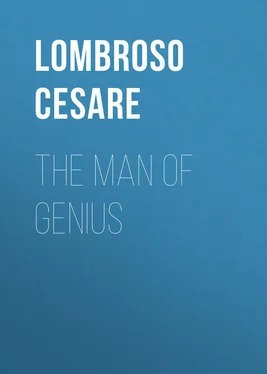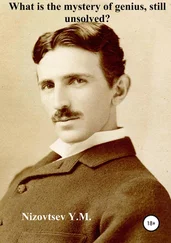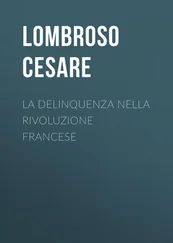Cesare Lombroso - The Man of Genius
Здесь есть возможность читать онлайн «Cesare Lombroso - The Man of Genius» — ознакомительный отрывок электронной книги совершенно бесплатно, а после прочтения отрывка купить полную версию. В некоторых случаях можно слушать аудио, скачать через торрент в формате fb2 и присутствует краткое содержание. Жанр: foreign_antique, foreign_prose, на английском языке. Описание произведения, (предисловие) а так же отзывы посетителей доступны на портале библиотеки ЛибКат.
- Название:The Man of Genius
- Автор:
- Жанр:
- Год:неизвестен
- ISBN:нет данных
- Рейтинг книги:5 / 5. Голосов: 1
-
Избранное:Добавить в избранное
- Отзывы:
-
Ваша оценка:
- 100
- 1
- 2
- 3
- 4
- 5
The Man of Genius: краткое содержание, описание и аннотация
Предлагаем к чтению аннотацию, описание, краткое содержание или предисловие (зависит от того, что написал сам автор книги «The Man of Genius»). Если вы не нашли необходимую информацию о книге — напишите в комментариях, мы постараемся отыскать её.
The Man of Genius — читать онлайн ознакомительный отрывок
Ниже представлен текст книги, разбитый по страницам. Система сохранения места последней прочитанной страницы, позволяет с удобством читать онлайн бесплатно книгу «The Man of Genius», без необходимости каждый раз заново искать на чём Вы остановились. Поставьте закладку, и сможете в любой момент перейти на страницу, на которой закончили чтение.
Интервал:
Закладка:
Megalomania ( Delusions of grandeur ). – The delirium of melancholia alternates with that of grandiose monomania.
“The title ‘Son of David,’ ” writes Renan, “was the first which Jesus Christ accepted, probably without taking part in the innocent frauds by which it was sought to make it certain. The family of David had, in fact, long been extinct.” Later on he declared himself the son of God. “His Father had given him all power; nature obeyed him; he could forgive sins; he was superior to David, to Abraham, to Solomon, to the prophets. It is evident,” Renan continues, “that the title of Rabbi, with which he was at first contented, no longer satisfied him; even the title of Prophet or Messenger from God no longer corresponded to his conception. The position which he attributed to himself was that of a superhuman being.” He declared that he was come to give sight to the blind, and to blind those who think they see. One day his ill humour with the Temple called forth an imprudent expression: “This Temple, made by human hands,” he said, “I could, if I liked, destroy, and in its place build another, not made by human hands. The Queen of Sheba,” he added, “will rise up at the Judgment against the men of to-day and condemn them, because they came from the ends of the earth to hear Solomon’s wisdom; yet a greater than Solomon is here. The men of Nineveh will rise up at the Judgment against the men of to-day and condemn them, because they repented at the preaching of Jonah; yet a greater than Jonah is here.”
Dante’s pride, legitimate as it may have been, is proverbial. It is well known that he placed himself “ sesto fra cotanto senno ,” and declared himself superior to his contemporaries in style and the favourite of God: —
“ … e forse e nato
Chi l’uno e l’altro caccierà di nido…
… perchè tanta
Grazia in te luce prima che sei morto…”
At the Institute Dumas said with truth of Hugo: “Victor Hugo was dominated by a fixed idea: to become the greatest poet and the greatest man of all countries and all ages.” It is this, according to Dumas, which explains the entire life and all the changes in Victor Hugo, who began by being a Catholic and monarchist. “He could not submit to be shut up within a government and a religion where he had not the right to say anything and the chance to be first. The glory of Napoleon long haunted Victor Hugo. But the day came when he could no longer tolerate that any one should have glory equal to his own. The great captain must give way to the great poet; the giant of action must efface himself before the giant of thought. Is not Homer greater than Achilles? Victor Hugo came to believe himself superior to all human beings. He did not say, ‘I am Genius,’ but he began to believe firmly that the world would say so. His personages do not possess the characters of reality nor the proportions of man; they are always above and beyond humanity, sometimes reversed, not to say upside down; that was because Nature had for him aspects that were seen by no other. His eye enlarged everything; he saw herbs as tall as trees; he saw insects as large as eagles.”
Hegel believed in his own divinity. He began a lecture with these words: “I may say with Christ, that not only do I teach truth, but that I am myself truth.” 108 108 Von Sedlitz, Schopenhauer , 1872.
“Man is the vainest of animals, and the poet is the vainest of men,” wrote Heine, who knew. 109 109 Letters , 1885.
And in another letter: “Do not forget that I am a poet, and, as such, convinced that men must forsake all and read my verses.”
“Every one knows,” wrote George Sand of her friend Balzac, 110 110 Histoire de Ma Vie , v. p. 9.
“how the consciousness of greatness overflowed in him, how he loved to speak of his works and to narrate them. Genial and ingenuous, he asked advice from children, but never waited for the answer, or else opposed it with all the obstinacy of his superiority. He never instructed, but always talked very well indeed of himself, of himself alone. One evening, having on a beautiful new dressing-gown, he wished to go out, thus clothed, with a lamp in his hand, to excite the admiration of the public.”
Chopin directed in his will that he should be buried in a white tie, small shoes, and short breeches. He abandoned the woman whom he tenderly loved because she offered a chair to some one else before giving the same invitation to himself. 111 111 G. Sand, op. cit.
Giordano Bruno declared himself illumined by superior light, a messenger from God, who knew the essence of things, a Titan who would destroy Jupiter: “And what others see far ahead I leave behind.” 112 112 De Immenso et innumerat. , iii.
And again: —
“Nam me Deus alter
Vertentis sæcli melioris non mediocrem
Destinat, haud veluti, media de plebe, magistrum.”
The poet Lucilius did not rise when Julius Cæsar entered the college of poets because he believed himself his superior in the art of verse. Ariosto, after receiving the laurel from Charles V., ran like a madman through the streets. 113 113 G. Menke, De ciarlataneria eruditorum , 1780.
The celebrated surgeon Porta would not suffer any medical paper to be read at the Lombard Institute without murmuring and showing his contempt; as soon as a mathematical or philological paper was brought forward he became quiet and attentive. Comte gave out that he was the High Priest of Humanity. Wetzel intitled his works, Opera Dei Wetzelii . Rouelle, the founder of chemistry in France, quarrelled with all his disciples who wrote on chemistry. They were, he said, ignorant bunglers, plagiaries; this latter term assumed so odious a significance in his mind that he applied it to the worst criminals; for instance, to express his horror of Damiens he said he was a plagiary.
Many men of genius, while avoiding these excesses, nevertheless believe that they embody in themselves absolute truth; they modify scientific conclusions in their own interests, and in accordance with the part they are themselves able to take. Delacroix, become incapable of drawing beautiful lines, declared, “Colour is everything.” Ingres said, “Drawing is honesty, drawing is honour.” Chopin charged Schubert and Shakespeare with temerity because in these great men he always sought a correspondence with his own temperament. 114 114 Revue des Deux Mondes , 1883.
The Princess Conti having said to Malherbe, “I wish to show you some of the most beautiful verses in the world, which you have not yet seen,” he replied immediately with emotion, “Pardon me, madame, I have seen them; for, since they are the most beautiful in the world, I must have written them myself.”
Folie du doute. – Among men of genius we often find the phenomena which characterizes that disorder termed by alienists folie du doute , one of the varieties of melancholia. In this form of insanity the subject has every appearance of mental health; he reasons, writes, and speaks like other people; everything goes well until he has to execute a definite action, and in this he finds all sorts of imaginary dangers. Thus I have treated a woman who when she had to get up in the morning, would hesitate for hours beside her bed, with one arm in the sleeve of her chemise, and the other sleeve hanging down, until her husband came to her help. Sometimes the husband was obliged to give her a few slight blows to induce her to take action. If she went for a walk and knocked against a stone, or came across a puddle, she would remain motionless; her husband had then to carry her for a few instants. In conversation she seemed the best and most sensible of mothers, but woe to the unfortunate person who dropped any word she regarded with suspicion, such as “devil,” “death,” “God”; she immediately seized him and cried out, until he repeated a certain formula, declaring a dozen times that the word had not been uttered to injure her. A peasant, affected by the same disorder, was incapable of attending to his work, unless some one was there to watch over him; for, said he, “I cannot make up my mind whether I ought to dig or to hoe, to go to the field or to the hill, and my uncertainty is so great that I end by doing nothing.”
Читать дальшеИнтервал:
Закладка:
Похожие книги на «The Man of Genius»
Представляем Вашему вниманию похожие книги на «The Man of Genius» списком для выбора. Мы отобрали схожую по названию и смыслу литературу в надежде предоставить читателям больше вариантов отыскать новые, интересные, ещё непрочитанные произведения.
Обсуждение, отзывы о книге «The Man of Genius» и просто собственные мнения читателей. Оставьте ваши комментарии, напишите, что Вы думаете о произведении, его смысле или главных героях. Укажите что конкретно понравилось, а что нет, и почему Вы так считаете.












